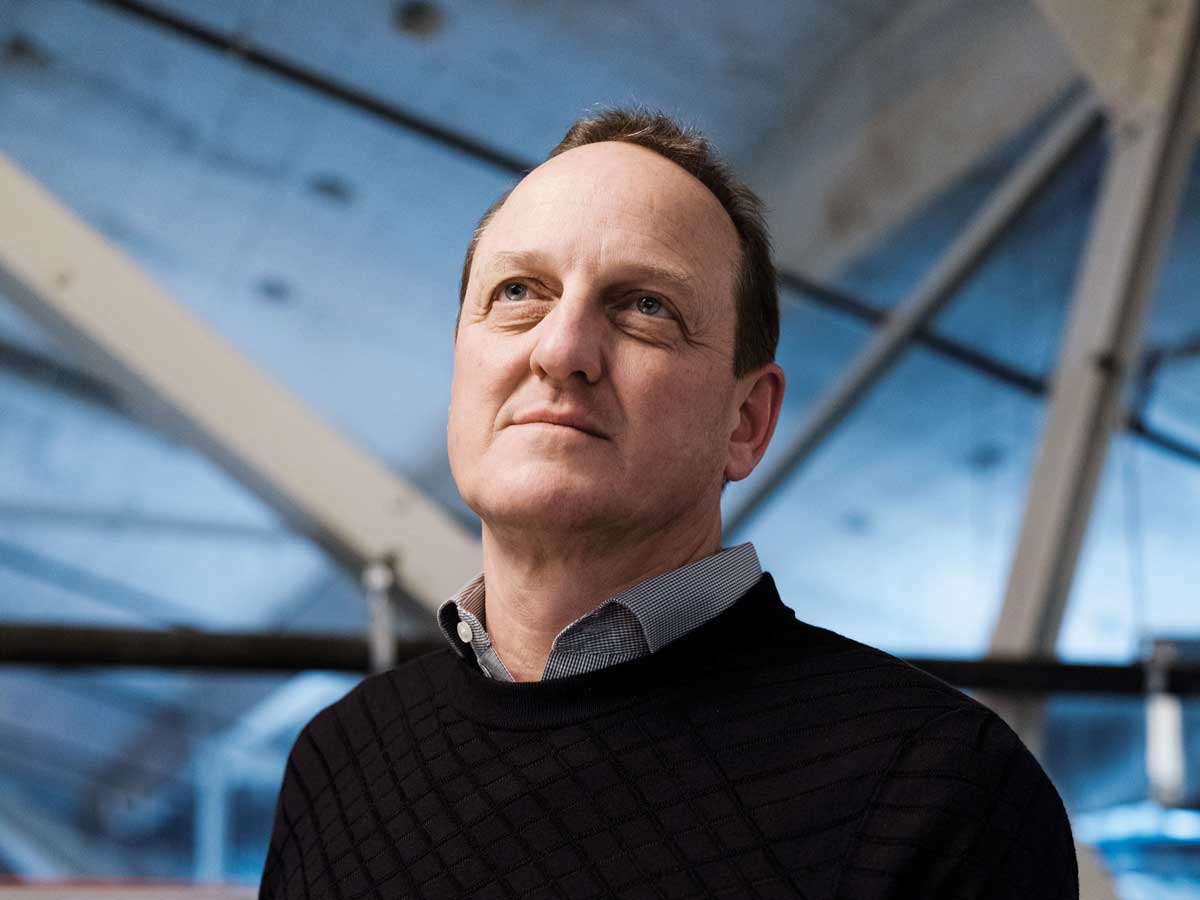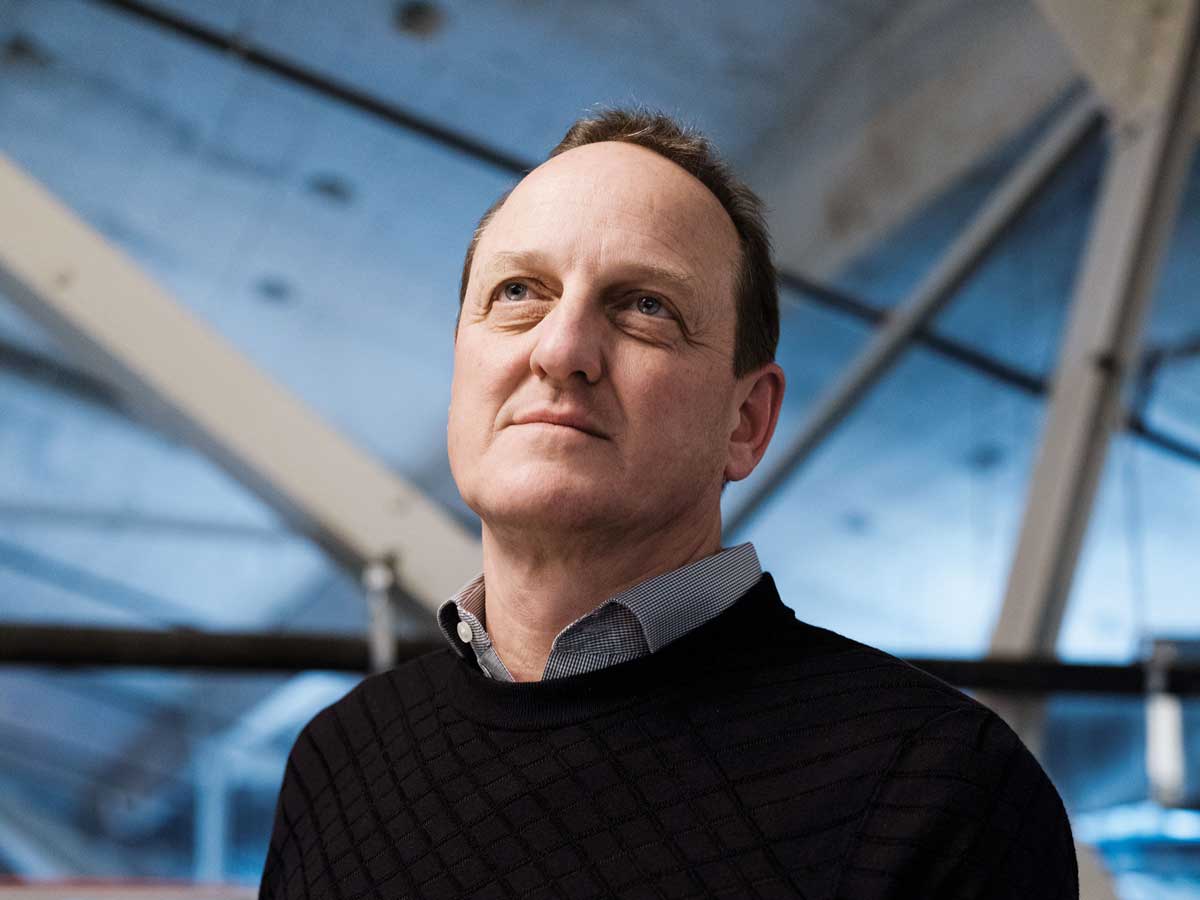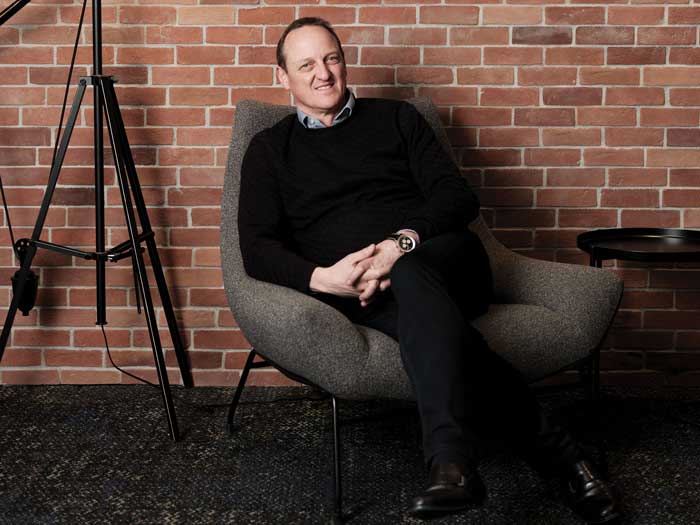
Louis Têtu wants to level the playing field
 Coveo CEO Louis Têtu (Photography by Guillaume Simoneau)
Coveo CEO Louis Têtu (Photography by Guillaume Simoneau)
When Jeff Bezos started an online bookstore in his garage 26 years ago, he was a proverbial David slinging stones at a Barnes & Noble-shaped Goliath. By last January, when Amazon briefly became the most valuable public company in the world, Bezos was no longer David. He was Goliath.
Louis Têtu sells slingshots to anyone bold enough to wage war against today’s tech giants. As CEO of the Quebec City-based software firm Coveo, he offers his customers—companies that typically don’t have armies of developers and data scientists—access to the technologies that fuelled Amazon’s ascent: machine learning, analytics, intent detection, natural language processing and beyond. “Every company wants to be like Amazon. They want a fair chance at competing against the tech-first companies: Netflix, Uber, Wayfair,” says Têtu. “This is the wave that Coveo is riding. We are trying to democratize the use of data and AI.”
Coveo’s success hinges on Têtu’s belief that we are now living in an experience economy. Whereas Ford, Walmart and other Goliaths of the past invented and sold things, modern juggernauts specialize in experiences—or, more precisely, reducing the time and effort between the moment we want something and the moment we get it. Uber didn’t invent the taxi; it made it easier to hail and pay for one. Amazon didn’t invent the department store; it offered lower prices, more selection, faster deliveries and the ability to go on a shopping spree by simply yelling, “Hey Alexa!”
The more we use these services, the more streamlined they become. Machine learning algorithms analyze our past purchases and behaviours to determine what we want and need, sometimes before we figure it out ourselves. (Thirty-five per cent of Amazon purchases and 80 per cent of Netflix viewing are the result of personalized recommendations.) “Tech-first companies have trained us to get what we want when we want it,” says Têtu. “The effortless journey to fulfilling your intent is what makes businesses win or lose in this decade. It’s not the product. It’s the experience.”
To thrive—or survive—in the experience economy, every company needs to leverage data and AI to provide the level of ease, speed and personalization that customers now expect. Otherwise, they won’t be customers much longer. The moment they can’t find a product on your shelves, they’ll take out their phones and buy it online, giving their business to your competition from the aisles of your store.
Few businesses have the resources or technological know-how to out manoeuvre the likes of Amazon. Têtu pitches Coveo as a way for those companies to fight back. He calls it an “experience intelligence platform”—which, in layperson’s terms, might translate to One Software to Rule Them All. Today’s businesses are drowning in platforms: CRMs, ECMs, CMSs, BPMs. If you don’t know what those are, that’s the point: Making sense of these tools and all the data they collect can be overwhelming. Coveo is the unifying backbone, says Têtu, “the layer of software that connects it all and delivers personalization at scale across those experiences.”
“Louis and his team recognized where the world was going before the world knew”
At its core, Coveo is a search tool. Type in a keyword or a question, and it will scour the digital nooks and crannies of an organization—some combination of emails, databases, product catalogues, public and private documents, web pages, all those acronymic platforms and more—to find what you’re looking for. It can point an accountant to an obscure tax law, a confused customer to the appropriate FAQ, or an online shopper to the perfect product. Like Amazon or Netflix, it learns as it goes, better understanding users and becoming more predictive with every search.
Coveo remained in relative obscurity until November 2019, when OMERS Growth Equity led a head-turning $227-million investment into the company, one of the largest rounds in Canadian tech history. The investment makes Têtu the rare CEO to have led two companies with valuations above $1 billion. (Oracle purchased his last, Taleo, for US$1.9 billion.) “Louis and the team recognized where the world was going before the world knew, and they started to build technology that allowed them to get far ahead of everybody,” says Mark Shulgan, the managing director of OMERS Growth Equity.
Coveo’s 1,500 customers include some of the Big Four and CPA Canada, each of which pays between five figures and multiple millions every year to use the firm’s software platform. For them, Têtu frames Coveo as a means of survival: “If you implement Coveo, you’re going to be a participant in the winner-take-all economy,” he says. “You’re not going to be Blockbuster. You’re going to be Netflix.”
 Têtu at Coveo’s Quebec City office (Photography by Guillaume Simoneau)
Têtu at Coveo’s Quebec City office (Photography by Guillaume Simoneau)
In technical terms, Têtu is the CEO of a pure cloud-native, multi-tenant software-as-a-service company—and he knows exactly how unenticing that sounds. Speaking about “customer search journeys” at Coveo’s conference last year, he joked, “Not a good conversation to have at a bar.” On the tech-CEO spectrum, he is more Rolex-and-cuffs than hoodie-and-jeans. At 55, he spends his long weekends flying helicopters and small planes or skiing with his wife, Louise, with whom he has three adult children.
If you catch Têtu using the royal “we,” he’s probably speaking on behalf of his executive team. He’s worked with the same core group—COO Guy Gauvin and CFO Jean Lavigueur—for 30 years, abiding by a philosophy of “no fear, no greed, no guilt.” Despite building two billion-dollar companies, “there were times when things looked super grim for us,” says Lavigueur, a CPA who describes Têtu as a gifted strategist whose decisions are informed by data, not rank. The trio survived the dot-com crash of 2000 by wrangling an investment from Bain Capital, and then carried Coveo through the last recession despite abruptly losing their largest source of revenue, a partnership with Microsoft, in 2009. The team gives off the impression that they long ago became an inseparable hive mind. “If they go home, I go home. It’s as simple as that,” says Têtu. “I could not work without these guys.”
Coveo has offices in San Francisco, London and Montreal, and its headquarters are in Quebec City, where Têtu grew up. The youngest of five, he was a precocious child. He skipped two early grades and graduated from Laval University with a mechanical engineering degree at 20; the society called to tell him he was the youngest mechanical engineer in Canada.
Têtu spent a year in Bell’s management-training program, but it wasn’t for him. “I was looking up the ladder and realized I didn’t aspire to do my boss’s job, or the level above that.” Instead, at 23, Têtu quit and joined his older brother’s company, Berclain, which made software that automated scheduling in manufacturing plants. “We had no idea what we were doing,” he says. Yet within five years, the brothers had hundreds of employees on four continents and counted Boeing and John Deere among their customers.
After Berclain merged with the Dutch software company Baan, the team eventually left the business they’d built and started another: Taleo, which digitized and automated hiring. By 2005, Têtu had 1,000 employees in 40 countries and hundreds of Fortune 500 customers. After the company went public, the board suggested he move to Silicon Valley. Instead, he stepped down as CEO, hired his own replacement, remained executive chairman and moved his family to Toronto; he wanted his kids to live their teen years in a cosmopolitan, multicultural city. Today, they’re the global citizens he envisioned, living in London, Dublin and Montreal.
By 2012, when Oracle acquired Taleo, Têtu had his eye on another venture: Coveo. He had been an angel investor since 2008, but as the company grew, the board and founder, fellow Quebec City entrepreneur Laurent Simoneau, brought Têtu and his team aboard. “You jump on a roller coaster, and it’s one heck of a ride,” says Lavigueur. “At the end, it’s nice to take a break. But after a little while, you say, ‘I want to do it again.’ ”
“Every day, there’s so much new content. How do you make sense of all that data?”
Trying to pinpoint exactly what Coveo does is as difficult as explaining what Amazon is. Tableau, a data visualization company in Seattle, uses Coveo to help customers troubleshoot software questions online, which reduces the number of support calls it receives, cuts deflection rates and saves the business up to $18 million a year. For Atlanta’s Acuity Brands, Coveo provides a searchable central marketplace that encompasses 5,000 products from 32 brands with 14 different websites. Lavigueur says accounting firms use Coveo to connect and extract insights from disparate sources of information: spreadsheets, financial statements, letters, software, rules, case law and tax codes from any number of jurisdictions. “Tax departments deal with a lot of fresh data that is relevant to the value they need to deliver to their customers,” says Lavigueur. “Every day, there’s so much new content. How do you make sense of all that data?”
Coveo also uses the platform to make sense of its own data. The company collects information about the way customers use the software—visits, impressions, click-through data and so on—in an aggregated, anonymized form and feeds it to machine learning algorithms that improve functionality. A chief information security officer and data protection officer ensure compliance with data and privacy regulations, such as the EU’s GDPR.
According to the American research firm Gartner, Coveo’s closest competitors include Lucidworks, a San Francisco-based firm that raised US$100 million last August to develop its AI-powered “insight engine” Fusion, as well as Mindbreeze, a subsidiary of the Austrian software giant Fabasoft; its InSpire platform scored highest on customer satisfaction in a 2019 Gartner report. “In such a dynamic market,” the report’s authors conclude, “there is still room for vendors to differentiate themselves.”
Têtu hopes the OMERS investment will help Coveo jump to the front of the pack. He plans to use the cash to grow aggressively across the board, including hiring 270 people in 2020, which will bring Coveo’s total head count to 750. Many of those new employees will be developers and R&D staff who can concoct new software applications. “Coveo can be used in virtually any industry,” says Shulgan, adding that, when Têtu pitched OMERS, the investors in the room started asking: If the software can do this, could it do that? “It was incredible to see the number of light bulbs going off around the table,” he says. “At this point, Coveo is only addressing a sliver of what’s out there. We think the total market size is huge.”
Têtu acknowledges that the COVID-19 pandemic may hamper Coveo’s near-future growth plans. His first priority, he says, is protecting his employees’ health and job security, and providing consistent service to customers. But he has long been preparing for this moment: Têtu has always intended to use the OMERS money to make acquisitions in the event of a market downturn. “Coveo can become a home for companies that might not be in a great position after this,” he says. “I’m trying to sort out what is truth versus fantasy versus drinking my own Kool-Aid, but I think Coveo is approaching the leadership position.” It may not be in Goliath territory just yet, but Têtu definitely isn’t David anymore.
FUTURE SKILLS
Read the CPA Canada publications A CPA’s Introduction to AI: From algorithms to deep learning, what you need to know and Big data and artificial intelligence – the future of accounting and finance to understand the buzzwords around AI and how this technology might impact your work.